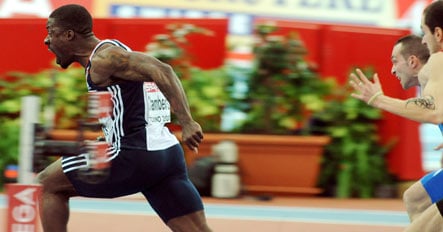Gerhard Janetzky, organiser of Berlin’s ISTAF meeting, has told German newspaper Der Tagesspiegel he is prepared to invite the newly-crowned European Indoor champion to the meeting at Berlin’s Olympic Stadium on June 14, despite Chambers’ previous doping suspension.
And Chambers is hoping sympathy in Berlin may lead to further invites to other high-profile outdoor meetings this summer ahead of the World Athletics Championships, which will also be held in Berlin in August.
“I’ve just heard, this is good news,” the 30-year-old said on Tuesday. “I’m sure if I do get into Berlin, this will have a roll-on effect for other meetings as well. I’m just looking forward to competing again against the best guys in the world.”
“We haven’t even started looking at the outdoor season, it was important to get my indoor campaign out of the way first. I’m absolutely very grateful to the organisers and I just hope more will follow.”
Chambers set a new European Indoor record on Saturday when he ran 6.42seconds for the 60m at the European Indoor Championships in Turin.
In 2003, he was banned for two years – and from the Olympic Games for life – after failing an out-of-competition drug test for the THG steroid and subsequently admitted using performance-enhancing substances.
Despite his European Indoor success, British athletics bosses have since told him he will not be included in the Great Britain 4x100m squad for August’s World Athletics Championships in the German capital.
Chambers could yet still race at the world championships here if he wins an individual place through the British trial later this summer.
“The inequality of his treatment strikes me as disturbing,” Janetzky told Der Tagesspiegel this week. “I am surprised that Chambers seems to be regarded as the root of all evils. Many athletes have the right to race once they have finished their suspension, so why should Chambers be punished more severely?”
Janetzky has said he is prepared to offer Chambers a place at the ISTAF event despite Europe’s top athletics meetings adopting a resolution in 2008 refusing to invite athletes who have failed doping tests in the past.
But Janetzky said he would have no problem inviting Chambers having already been approached by the athlete’s advisors.
“I do not believe sprinters will boycott Berlin just because of his presence,” added Janetzky, who is hoping to attract triple Beijing gold medallist Usain Bolt, Jamaica’s Asafa Powell and America’s Tyson Gay to Berlin for the ISTAF meeting.
But Chambers faces an uncertain future after the International Association of Athletics Federation launched a probe on Monday into his newly-released book.
The British sprinter has stirred up a storm with his book ‘Race Against Me,’ which was released on Monday.
In the book, Chambers has serialised the events that led up to him being banned for two years for testing positive in October 2003. But the revelations have caused concern at the IAAF, who fear he has tarnished the sport’s image.
UK athletics chairman Ed Warner revealed he has been in contact with the governing body about the matter last weekend, and that they will digest the contents of Chambers’ book over the next few days.



 Please whitelist us to continue reading.
Please whitelist us to continue reading.